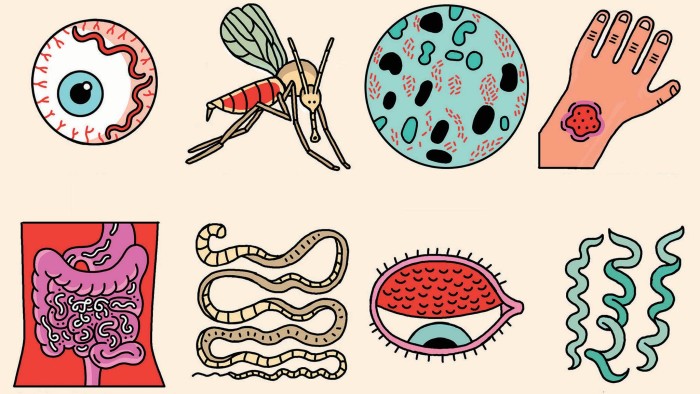FT Health: Diseases less neglected

Roula Khalaf, Editor of the FT, selects her favourite stories in this weekly newsletter.
There were celebrations, fresh pledges of support and even a giant inflatable yellow schistosomiasis worm floating on Lake Geneva this week to mark five years since the London Declaration on neglected tropical diseases. One billion people are now being treated for at least one such condition each year, and strong progress is being made towards eliminating several of them — including lymphatic filariasis and onchocerciasis.
Mass drug administration, supported by donations from a dozen pharmaceutical groups, plays an important part in this success. Fresh innovation is needed to produce better medicines and diagnostics. Delivery systems and improved management, surveillance and political leadership are also essential — highlighted in the FT’s Neglected Tropical Diseases special report this week.
Nature has a way of adapting more quickly than humans, as the emergence of Guinea worm in dogs and even frogs has shown. Complete eradication is proving frustratingly elusive as a result.
Neglected tropical diseases (NTDs) are ultimately diseases of neglected people, whether in Uganda or the poor south of the US. Without economic and social development, including much more effective health and sanitation systems, they will continue to exact a heavy toll.
Watch our video discussion with Dirk Engels, head of NTDs at the World Health Organization; Dhekra Annuzaili, public health specialist from Yemen; and Andy Wright from GSK
———-
Three questions
We talk to Seth Berkley, chief executive of Gavi, the Vaccine Alliance, ahead of world immunisation week, marked by an FT Health special report on vaccines.
What have you changed at Gavi?
First, we have focused on data. We are more in touch now with the situation in countries. The next level of difficulty is understanding sub-national data to help us concentrate on coverage and equity. In Pakistan, for instance, the use of phones to report on polio has raised vaccination rates. It’s not about science but simple management . . . Second, we have made our model country-facing, with joint appraisals on evaluation and technical assistance to ensure that governments are getting the best advice they need.
Is there a risk of “vertical” vaccine programmes undermining health systems?
I’m against vertical systems [those that focus on a particular approach or disease at the expense of a stronger overall health system] but universal health coverage is a vague veneer. I think Gavi is a pretty amazing story in the development space. Immunisation is one of the most cost-effective interventions and if you don’t have it, you don’t have a perfect health system. With vaccines, I see our goal as building the base of the primary healthcare system.
What are your concerns about the future?
It’s an important moment for our model, with lower-income countries becoming richer and “graduating” from our help. Overall they are doing quite well although there are a few problems in the commodity exporting ones which are “rich” but not really investing in social systems. Sometimes the problem is not about money but political commitment: the willingness, not the ability to pay. There is a question about what we do about new vaccines, and helping countries with shocks like refugees and drought.
———-
Chartwatch
Drug donations Pharma companies provide more than 1.8bn treatments a year for neglected tropical diseases. (FT)

———-
News round-up
‘Weaponisation of healthcare’ The bombing of the hospital caring for survivors of the Syrian chemical attack is but the latest example of the wounded and sick being denied their fundamental rights to medical care. Political leaders must stand up and support the rules that govern conflict and protect the vulnerable caught up in it. (Chatham House)
The politics of aid The Public Health Foundation of India was banned from receiving foreign funding, including from the Gates Foundation, after tobacco industry lobbying. (FT)
Modifying mosquitoes Florida authorities are experimenting with containing the Zika outbreak by releasing bacteria-infected mosquitoes. When the lab-bred insects — from MosquitoMate — mate with females carrying the virus, their offspring do not survive. Officials are considering a separate test of mosquitoes genetically modified by Britain’s Oxitec. (NBC)
Bird flu clipped South Korea, Japan and the UK all reported positive news on avian flu, but France halted foie gras production in the south west of the country to curb the spread of the H5N8 strain. (Cidrap)
Climate effects More US citizens are at risk of climate-change related illnesses — from mosquito-borne infections to respiratory problems — while researchers fear for the future of the Environmental Protection Agency’s plan to cut greenhouse gas emissions. Dehydration is striking down labourers across the world. (CNN, Mosaic)

Water spending Countries must triple investments in infrastructure to $114bn a year to reach the UN goal of universal access to safe water and sanitation by 2030. (WHO)
Sanofi shock France's drug regulator said valproate, Sanofi's epilepsy drug, had caused serious birth defects in thousands of children, echoing the thalidomide scandal of the 1960s. The drug, introduced in France in 1967, is sold under the brand Depakine to treat epilepsy and as Depakote or Depamide for bipolar disorders. (FT)
Marching for science Scientists across the world will march through 500 cities on Saturday in the biggest demonstration of scientific solidarity ever staged. The original March for Science in Washington DC was planned to coincide with Earth Day as a protest against what the organisers viewed as President Donald Trump’s “anti-science” stance. (FT)

Smoke alarm Some 44% of the world’s cigarettes are smoked in China. The WHO warned that tobacco would kill more than 200m Chinese this century without tougher counter-action. (WHO)
Marijuana markets Better news for other types of smoker: Canada is on the brink of legalising medical marijuana. Deloitte values the retail market at up to $8bn a year with a wider benefit of more than $20bn thanks to cannabis-related tourism, taxes and testing labs. South of the border, more than half Americans have smoked the drug. (FT, Yahoo)

Tech titans weigh in Alphabet, Google’s parent company, is funding a study of 10,000 people to collect data that may lead to better understanding of disease. Subjects will be monitored for four years via smartwatches and sleep sensors. Other tech companies such as Apple, IBM and Microsoft are tackling illnesses from diabetes to cancer. (FT, Stat)
Medical devices Medtronic followed Abbott and Johnson & Johnson in shrinking operations to focus on niche products. The company is selling its medical supplies business to Cardinal Health. (FT)
Immunotherapy hopes Incyte is attracting attention from other US biotechs after successful trials of Epacadostat, its second generation immunotherapy drug, sending its shares up 60%. First generation immunotherapy drugs already on the market include Merck’s Keytruda, Roche’s Tecentriqy, and BMS’ Opdivo. (FT)

Politics and health Theresa May called a snap UK election for June 8 as a survey showed health jostling with Brexit as the most important issue for voters. Departure from the bloc will also mean the UK losing any rights to hang on to the EMA, Europe's medicines regulator. (BBC, FT, Reuters)
Antidepressant alert Mental health issues sprang to prominence in the UK as Princes Harry and William sought to dispel the stigma surrounding the problem. A survey detailed the link with deprivation, with poorer areas seeing a huge rise in prescriptions for antidepressants. (Calm, Guardian)

Frogs and dragons The race to find new antibiotics has led to an unusual source: the Komodo dragon. US researchers say the reptile's blood has powerful germ-killing properties. Frog slime meanwhile was found to be effective at combating flu. (NYT, Immunity)

———-
Best from the journals
Tackling NTDs More funding is required to tackle neglected tropical diseases, says PLOS in a 10th anniversary edition of an open access journal on NTDs. Its investment priorities should include research, improved training and integrating control programmes with other development initiatives. (PLOS NTDs, The Lancet)
Sugar tax The first US sugar tax — in Berkeley, California, has led to a 10% drop in sugary drink sales and a rise in purchases of water, raising hopes that such taxes can be introduced more widely. A separate study showed a possible link between artificially sweetened drinks and a higher risk of stroke or dementia. (PLoS Medicine, Stroke)
Two wheels good Good news for Mamils (middle-aged men in Lycra): A new UK study shows commuting by bike lessens the chances of cancer as well as cardiovascular disease. Policies including the building of cycle lanes, subsidised bike purchase schemes and better provision for cycles on public transport should be encouraged. (BMJ)
Investing in youth Improving the physical, mental and sexual health of adolescents, at the cost of $4.6 per person per year, could bring a 10-fold economic benefit. (The Lancet)
Community health workers Despite performing valuable work, health workers are still largely undefined and unsupported. They need to be formally integrated into health systems with supervision, training, clear career structures — and regular pay cheques. (The Lancet)
Health spending The US spends the most on healthcare per person at $9,237 a year and Somalia the least at $33. By 2040, global expenditure is forecast to hit $24tn from $9tn in 2014. (The Lancet, two studies)
———-
Podcast of the week
The letter that changed me: an MSF medic describes his experiences dealing with the aftermath of earthquake in Haiti. (MSF Everyday Emergency series, 23m)
———-
In case you missed it
FT Health Last week's edition: Cholera in Haiti
Previous editions available on our Facebook page
———-
Coming up
Mon Apr 24 World Immunisation Week
Tues Apr 25 FT Health: Combating malaria (World Malaria Day)
Latest news www.ft.com/health and @FT_Health
———-
Final thought
Aid and self interest Britain's foreign aid budget in the post-Brexit age is again in the spotlight. Bill Gates says the UK has one of the most efficient regimes in the world but others argue it is wasteful. Martin Wolf, FT chief economics commentator, says Britain must continue to lead — not just for altruistic reasons but because rich countries cannot seal themselves off from the next global pandemic or wave of desperate refugees to approach their shores. (FT)

Comments